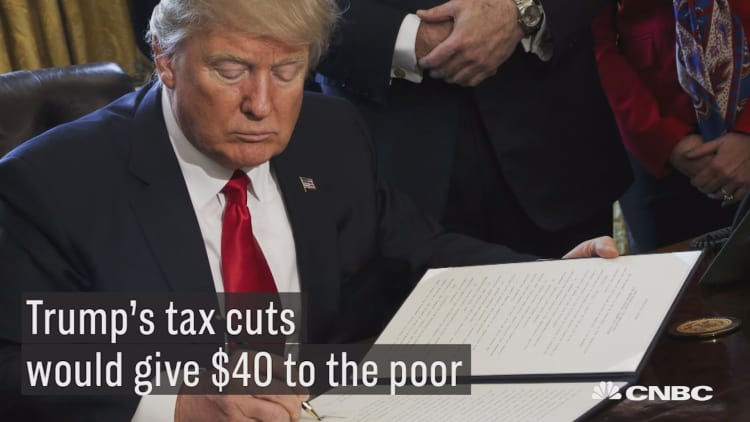
With health care reform all but dead for this year, Wall Street is beginning to write the obituary for tax reform as well.
The thinking is that true "reform" is pretty much dead in its truest form, which would entail a rewriting of the tax code that would simplify the structure and broaden the base of those who pay to fund cuts elsewhere.
With a Republican majority unable to agree on pretty much anything, and given the complexity of reform, the chances of any major package getting through are dim.
All is not lost, however: Sentiment is growing that absent reform Congress is much more likely to agree to tax cuts now while worrying about how to pay for them pushed off until later.
"Significant tax reform has not occurred since 1986 (31 years ago), and the political landscape today is likely to keep that clock ticking," Mark Doms, senior economist at Nomura, said in a report for clients. "Passing comprehensive tax reform takes considerable time, and a high-level agreement has yet to be reached within the Republican ranks."
The firm is the latest to weigh in on a pressing question both for Washington and Wall Street.
Wall Street has had mixed reactions so far to the prospect that tax cuts would substitute for real reform. Some have said getting more money into consumers' hands would be beneficial, while others have been more skeptical about what will come of the process. Liz Ann Sonders, chief investment strategist at Charles Schwab, recently tweeted:
Tax reform = good; tax cuts = less good; temporary tax cuts = not good
Investors had expected rapid pro-business action on multiple areas of reform, the two most prominent being a repeal of Obamacare and some relief in the U.S. where nominal corporate tax rates are the highest in the developed world.
However, the year has been filled with letdown in both regards, the latest being the collapse of a repeal-and-replace effort that died not because of Democratic opposition but rather from within the GOP's own ranks.
Herding Republicans around an issue as complex as taxation likely won't be much easier.
"The health care reform episode highlighted a lack of pre-planning and an absence of a cohesive legislative strategy," Doms said. "For taxes, Republicans face similar hurdles. They do not yet have a unified plan that has been vetted by party members and their constituents."
He does think the GOP will get something done — but doubts it will be particularly meaningful.
The scenario is a cut that would amount of about 0.5 percent of U.S. GDP, or about $450 billion. Its net effect would be to bump up 2018 GDP growth by 0.1 percentage point.
Moreover, Doms expects no action this year on corporate tax hikes but rather small decreases for individuals.
In all, it would "have modest effects on growth, financial markets, and on Federal Reserve policy."
Getting more done would be difficult both because of internal fights within the Republican bloc and the complexity of tax reform, Doms said. The note pointed out that the 1986 tax reform measure was 878 pages, while tax cuts acts in 2001 and 2003 respectively totaled just 112 and 16 pages.
"Given that a broad agreement on principles has yet to be reached by the Republican leaders in the House, Senate, and the White House, it is unlikely that significant reforms can be reached before next year's elections," he wrote.


